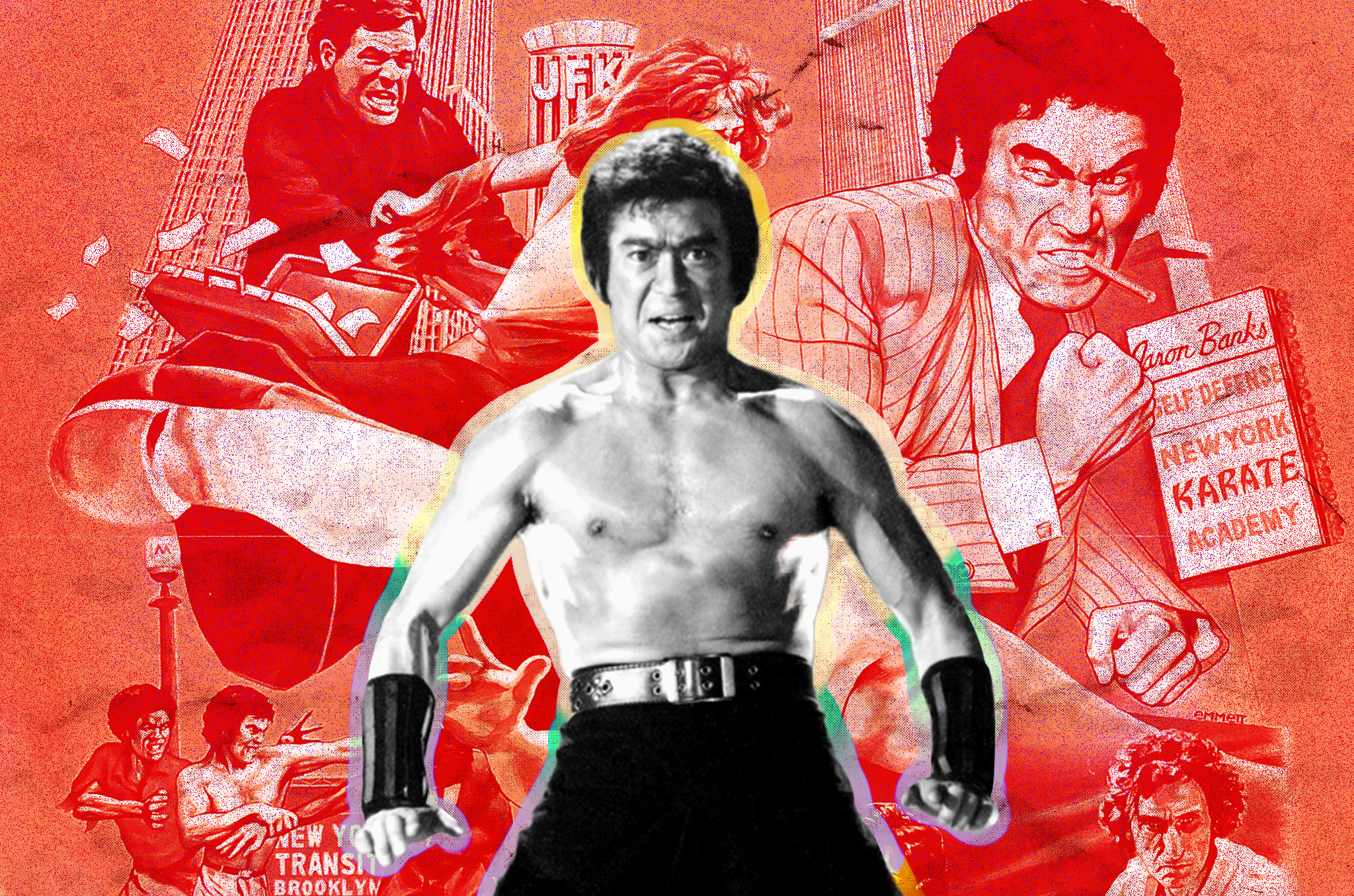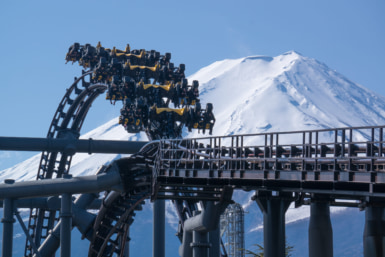Clarence: How ‘bout you go to the movies with me tonight?
Lucy: What are we going to see?
Clarence: A Sonny Chiba triple feature. Streetfighter. Return of the Streetfighter. And Sister Streetfighter.
Lucy: Who is Sonny Chiba?
Clarence: Who is Sonny Chiba? He is … he is, bar none, the greatest actor working in martial arts movies today.
Lucy: You wanna take me to a kung fu movie?
Clarence: Three kung fu movies.
These lines are taken from the opening scene of Tony Scott’s cult classic True Romance (1993), as Christian Slater’s Elvis Presley-obsessed character, Clarence, tries to woo Lucy (Anna Thomson) at a bar. The romantic crime film, written by Quentin Tarantino, was, for many people outside Japan, an introduction to the cinematic world of Sonny Chiba.
Already a legendary figure in his native homeland and among fans of martial arts films, Chiba’s status around the world received a significant boost from the name-check in True Romance, and he went on to feature in the Hollywood films Kill Bill: Volume 2 and The Fast and the Furious: Tokyo Drift. With today being the third anniversary of his death, we’re looking back at the life and career of one of Japan’s most revered actors for the latest in our Spotlight series.
Sadaho Maeda’s Background
Born Sadaho Maeda in Fukuoka on January 23, 1939, Chiba was the third of five children. His father was a pilot and his mother had been a track and field athlete during her younger days. She clearly passed on her athletic genes to her son, who played various sports during his school days and was particularly strong at artistic gymnastics.
Inspired by Japanese gymnasts at the 1952 Summer Olympics in Helsinki, he dreamed of one day appearing at the Games himself and, while he was a student at Nippon Sports Science University, that looked like it might be in the cards. He practiced along with several future medalists, but injuries ended his hopes of pursuing a career in gymnastics.
When one door closes, another invariably opens, and that’s what happened to Chiba. In his early 20s, he was discovered during Toei Studios’ New Faces competition and made his television debut as the titular character in the tokusatsu superhero show Seven Color Mask in 1960.
The next year, he featured in nine Toei productions, including Drifting Detective: Tragedy in the Red Valley, the directorial debut of legendary Japanese filmmaker Kinji Fukasaku. The pair collaborated on several projects after that, including Battles Without Honor and Humanity: Hiroshima Death Match (1973), Doberman Cop (1977) and Shogun’s Samurai (1978).
A True Martial Artist
Known by his stage name of Shinichi Chiba, the former gymnast became a prolific actor, but he still had to find time to develop his martial arts skills. In 1965, he received a first-degree black belt in karate. He also went on to earn black belts in various other disciplines, including kendo, ninjutsu and judo.
Chiba began studying martial arts during his university days under the tutelage of Mas Oyama, a Zainichi Korean karate master who founded Kyokushin karate. He later played Oyama in the trilogy of films based on the manga Karate Master: Champion of Death (1975), Karate Bearfighter (1975) and Karate for Life (1977).
In 1970, Chiba opened Japan Action Club (JAC), a training school for aspiring martial arts actors and stunt performers. One of his most famous students was Hiroyuki Sanada, star of the recent Shogun series. Sanada had made his movie debut as a child actor in the 1966 yakuza film Game of Chance, with Chiba playing his father. The pair reprised the roles for two sequels the following year.
Chiba’s first martial arts film was The Bodyguard (also known as Karate Kiba) in 1973, though it was his starring role a year later that elevated his status globally. He played Takuma, a mercenary and anti-hero who takes on yakuza thugs in Shigehiro Ozawa’s classic, The Street Fighter.
In one scene, he tears off a rival’s testicles, while in another, he goes for the throat before showing off his adversary’s vocal cords to the camera. The Street Fighter, which spawned two sequels, was the first movie to earn an X rating in the United States because of its violent scenes.
Introducing Sonny Chiba
In the West, the man born Sadaho Maeda was now known as Sonny Chiba — a name given to him by New Line Cinema founder Robert Shaye. He continued to enhance his reputation as an action star thanks to movies like the supernatural cult classic Wolf Guy and the high-octane thriller The Bullet Train, both released in 1975.
In the latter, which inspired the action film Speed (1994), Chiba plays a conductor on a shinkansen that will blow up if it goes below 80 kilometers per hour. The bomb has been planted by a group of misfits led by Ken Takakura’s character, Tetsuo.
One of Chiba’s most famous roles during the 1970s was as the titular character in Golgo 13: Assignment Kowloon (1977). Based on Takao Saito’s record-breaking manga Golgo 13 — currently the oldest manga still in publication — the story centers around sniper Duke Togo (code-named Golgo 13), who’s hired by an American crime syndicate to take out a Hong Kong drug lord.
Influencing Tarantino
Another famous role for Chiba was a cameo appearance as Hattori Hanzo (who was a real-life samurai) in Tarantino’s Kill Bill: Volume 2 in 2003. The character was named in tribute to the part Chiba played in the jidaigeki series Shadow Warriors from the early 1980s. It was reportedly Tarantino’s favorite Japanese TV show. He was particularly interested in the way the ninjas delivered sermons about human morality to their targets before killing them.
“The guy who had to listen to the speech was sure to die in the end,” said Tarantino in an interview with Michel Ciment and Hubert Niogret in 1994. “My friends and I were always fascinated by these endings, which we found cool and poetic. It was in this spirit that I put the quotation from Ezekiel in Jules’ mouth.”
The Jules he is referring to is, of course, Samuel L. Jackson’s character from Pulp Fiction (1994), while the quotation is the famous Ezekiel 25:17 speech. The bulk of the quotation, however, isn’t a biblical verse. While it uses fragments from the Bible, it’s taken from the prologue of Chiba’s earlier movie, The Bodyguard, with a few small changes.
When the Japanese man visited the set of Pulp Fiction, Jackson was allegedly lost for words, but he did manage to ask him for an autograph. Another Hollywood star who bowed down in his presence was Keanu Reeves. Chiba gatecrashed a promotional interview he was doing for John Wick and Reeves was clearly taken aback to be meeting the man he called “Maestro.”
Chiba’s Death
During his career, which spanned around five decades, Chiba appeared in more than 125 movies. His final posthumous role was in Bond of Justice: Kizuna Part 1, released earlier this year. He died of COVID-19 on August 19, 2021. He had been due to feature in Outbreak Z, a zombie flick with Wesley Snipes.
Chiba had three children: his daughter, Juri, with his first wife, Yoko Nogiwa, and his two sons, Mackenyu and Gordon Maeda, with his second wife, Tamami. All three of his kids have been in movies, with Juri appearing alongside her father in Kill Bill: Volume 1.
Mackenyu is most well-known for playing Roronoa Zoro in last year’s live-action adaptation of the manga series One Piece. Gordon’s most famous role thus far was as Takashi Mitsuya in Tokyo Revengers (2021).
More From This Series
- Chikage Awashima — A Revered Stage and Screen Actor
- Toshiro Mifune — Japan’s Greatest Ever Actor
- Juzo Itami — The Legendary Tampopo Director Who Died in Mysterious Circumstances
Updated On March 10, 2025








